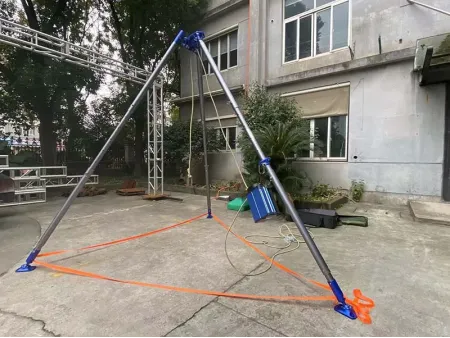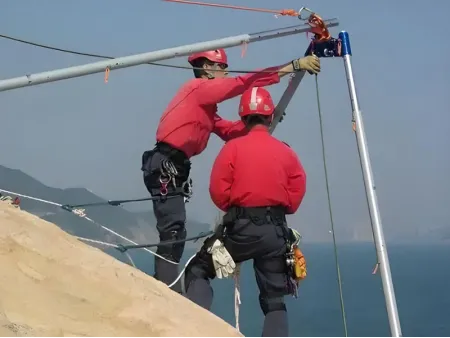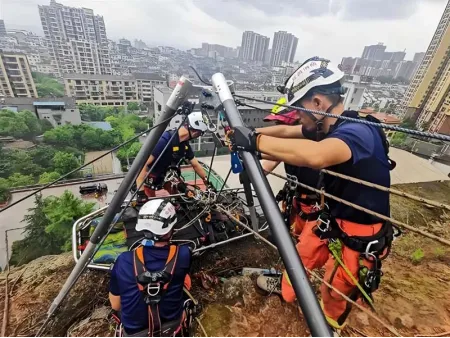Emergency Rescue Tripod
Confined Space Tripod Rescue System
The primary function of a rescue tripod is to provide a stable support platform, enabling swift and safe entry, exit, rescue, or retrieval of personnel during emergency rescue activities. Constructed from high-strength aluminum, this rescue tripod ensures safety and can be paired with a powered hoist for effortless lifting of heavy loads. Its adaptable design allows for various installation configurations, including equilateral tripod, unequal tripod, and tripod with triangular pyramid structure, ensuring that the Rescue Tripod is suitable for a wide range of vertical rescue scenarios. Whether used in vertical shaft rescues or challenging outdoor environments, this versatile tripod provides reliable support and is designed to meet the demands of complex rescue operations.
The modular rescue tripod is widely used in complex terrains, confined spaces, low-clearance workspaces, mountain rescue operations.
- Mountain rescue operations
- Complex terrain rescues
- Confined space rescues
- Stable and secure structure: The tripod utilizes a triangular support design, offering exceptional stability during rescue operations. Fixed straps connect the legs, preventing angle expansion and ensuring reliable support throughout the process.
- Portable and flexible: The modular design allows the tripod to be compactly folded for easy transport and storage. This enables rapid deployment in emergency situations, minimizing preparation time while conserving space.
- High adaptability: Featuring adjustable, non-integrated legs, the tripod can accommodate varying heights and confined spaces. This flexibility addresses the limitations of traditional rescue equipment, making it suitable for diverse and challenging scenarios.
Tripod Leg Length
| Number of Exposed Holes on Inner Legs | 1 | 2 | 3 | 4 | 5 | 6 |
| L1 | approx. 3.3m | approx. 3.4m | approx. 3.6m | approx. 3.7m | approx. 3.8m | |
| L2 | approx. 2.4m | approx. 2.5m | approx. 2.47m | approx. 2.8m | approx. 3m | |
| L3 | approx. 2.4m | approx. 2.5m | approx. 2.7m | approx. 2.8m | approx. 3m |
Note: L1, L2, and L3 represent three different lengths.
Optional Loads for Rescue Tripd
| Breaking Load | Working Load | Configuration | Rescue Tripod with Equilateral Triangle | Rescue Tripod with Triangular Pyramid Structure | Lifting Derrick |
| 22kN | 5.5kN | Outer Leg Count | 3 | 3 | 1 |
| Inner Leg Hole Exposure Count | 5 | 3 | 4 | ||
| Connection Point Height | 320cm | 320cm | 185cm | ||
| 36kN | 9kN | Outer Leg Count | 2 | 2 | |
| Inner Leg Hole Exposure Count | 5 | 5 | |||
| Connection Point Height | 241cm | 241cm |
Dimensions and Specifications
-
Equilateral Tripod
The load is positioned within the tripod's structure, supported by three evenly spaced legs for balanced and stable operation. -
Unequal Tripod
The load is positioned within the tripod, supported by three legs. An inclined support is equipped with a motorized hoist, enhancing lifting capability and operational efficiency. -
Pyramid-Style Directional Frame
In this setup, the load is positioned outside the frame and supported by two legs, offering a stable and efficient configuration for specific operational needs. -
Tripod-Style Directional Frame
In this configuration, the load is positioned outside the frame and supported by two of the tripod’s legs, offering enhanced directional stability and adaptability for specific tasks. -
Side A-Shaped Directional Frame
In this configuration, the load is positioned outside the frame and supported by a single leg, making it ideal for operations in smaller workspaces. -
Lifting Derrick
The load is positioned outside the frame and supported by a single leg. This configuration is suitable for small workspaces, providing a compact and efficient lifting solution.




